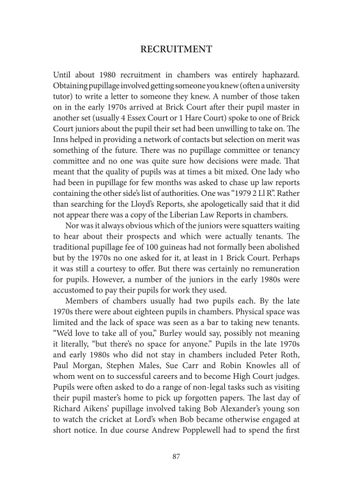RECRUITMENT Until about 1980 recruitment in chambers was entirely haphazard. Obtaining pupillage involved getting someone you knew (often a university tutor) to write a letter to someone they knew. A number of those taken on in the early 1970s arrived at Brick Court after their pupil master in another set (usually 4 Essex Court or 1 Hare Court) spoke to one of Brick Court juniors about the pupil their set had been unwilling to take on. The Inns helped in providing a network of contacts but selection on merit was something of the future. There was no pupillage committee or tenancy committee and no one was quite sure how decisions were made. That meant that the quality of pupils was at times a bit mixed. One lady who had been in pupillage for few months was asked to chase up law reports containing the other side’s list of authorities. One was “1979 2 Ll R”. Rather than searching for the Lloyd’s Reports, she apologetically said that it did not appear there was a copy of the Liberian Law Reports in chambers. Nor was it always obvious which of the juniors were squatters waiting to hear about their prospects and which were actually tenants. The traditional pupillage fee of 100 guineas had not formally been abolished but by the 1970s no one asked for it, at least in 1 Brick Court. Perhaps it was still a courtesy to offer. But there was certainly no remuneration for pupils. However, a number of the juniors in the early 1980s were accustomed to pay their pupils for work they used. Members of chambers usually had two pupils each. By the late 1970s there were about eighteen pupils in chambers. Physical space was limited and the lack of space was seen as a bar to taking new tenants. “We’d love to take all of you,” Burley would say, possibly not meaning it literally, “but there’s no space for anyone.” Pupils in the late 1970s and early 1980s who did not stay in chambers included Peter Roth, Paul Morgan, Stephen Males, Sue Carr and Robin Knowles all of whom went on to successful careers and to become High Court judges. Pupils were often asked to do a range of non-legal tasks such as visiting their pupil master’s home to pick up forgotten papers. The last day of Richard Aikens’ pupillage involved taking Bob Alexander’s young son to watch the cricket at Lord’s when Bob became otherwise engaged at short notice. In due course Andrew Popplewell had to spend the first 87
Issuu converts static files into: digital portfolios, online yearbooks, online catalogs, digital photo albums and more. Sign up and create your flipbook.














